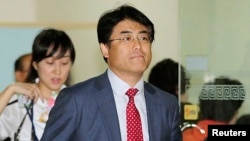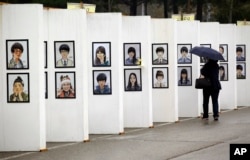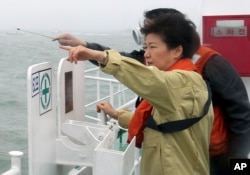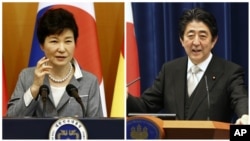In South Korea Thursday a court acquitted a Japanese journalist of criminal defamation for reporting that President Park Geun-hye was involved in an illicit tryst at the time a deadly ferry accident occurred last year.
The journalist's prosecution had drawn criticism from human rights and press advocacy groups concerned about the erosion of free speech in South Korea.
After the not guilty verdict was announced the defendant Tatsuya Kato, the former Seoul bureau chief for the Japanese newspaper Sankei, expressed no sense of satisfaction after his yearlong legal battle.
“The result of the trial was very obvious and I do not have any special emotion,” he said.
Allegation
The case was based on an article Kato wrote last year suggesting that President Park, who is not married, was absent for seven hours during the Sewol ferry disaster because she was engaged in an romantic liaison with a married aide.
Prosecutors had said Kato’s article was based on false facts and requested an 18-month prison term.
Kato maintains that he was targeted by the prosecution and defended his actions saying that the news story served the public's interest.
“I want to point out that the process was unfair and discriminatory from the start of the investigation,” he said.
Prior to the verdict, Foreign Ministry spokesman Cho June-hyuck said his office had contacted the prosecutor to ask for clemency.
The Sewol ferry capsized during a voyage to the island of Jeju in April of 2014. More than 300 passengers, many of them high school students, died.
Government criticized
Park’s business-friendly government was criticized for lax enforcement of public safety to bolster economic development. Her public approval rating dropped during the Sewol accident from 50 percent to 29 percent.
Some of president’s critics have voiced concerns that in pressing the case against Kato, Park abused the law to protect her image.
The controversial criminal defamation statute along with the national security law that authorizes the government to censor the media was intended to counter North Korean espionage and propaganda.
Free speech advocates have denounced criminal defamation laws as working against the public interest by deterring people from speaking out against misconduct by public officials.
In democratic societies, they argue, less harsh civil defamation laws, which award compensation for damages and don't sentence offenders to prison, and criminal incitement laws are sufficient for protecting reputations and maintaining public order.
'Stifles a free press'
A statement released by Phil Robertson, deputy director of Human Rights Watch’s Asia Division, expressed relief at the court decision but said “that doesn’t change the fact that South Korea’s criminal defamation law is problematic because it stifles a free press, has a chilling effect on freedom of expression, and works against the public interest by gagging critics and whistle-blowers.”
In 2011 Freedom House categorized South Korea as a “partly free” country that actively censors the media.
In 2012, the human rights organization Amnesty International called on the South Korean government to scale back or repeal the national security laws after it documented a dramatic and recent increase of cases that it said involved the government using the law in a “politically motivated attempt to silence debate.”
Journalist organizations, including Reporters Without Borders, have voiced concerns about this case and the possible chilling effect it could have on press freedom in South Korea.
Japan-Korea ties
Kato believes he was singled out for prosecution because his Japanese paper, the Sankei Shimbun, is aligned with the policies of Japan Prime Minister Shinzo Abe.
The trial came at a time of strained relations between Seoul and Tokyo, fueled by resentment in South Korea over Abe’s refusal to apologize and make restitution to the thousands of women forced into sex slavery by the Japanese military during World War Two.
In the last few months, the two major U.S. allies in Asia have met and agreed to work to find a peaceful resolution to their differences.
VOA News Producer Youmi Kim in Seoul contributed to this report.



